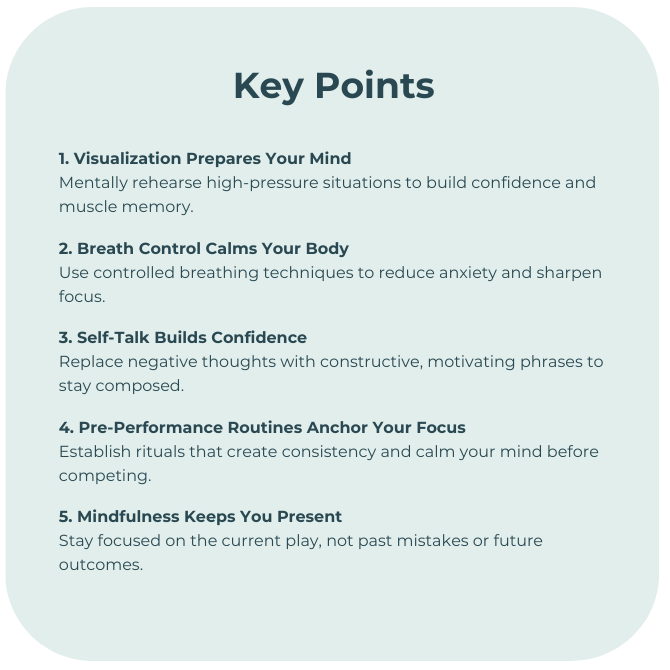Sports Psychology Techniques to Improve Decision-Making Under Pressure
What to Consider When Reading
Which sports psychology technique could help you most in your decision-making under pressure?
How can visualization and self-talk improve both your athletic and everyday performance?
Making decisions under pressure is something athletes face constantly—split-second choices that can change the game, push them to the top, or cause them to stumble. Whether it’s a basketball player deciding whether to pass or shoot, a tennis player anticipating their opponent’s move, or a goalkeeper choosing the right direction to dive, the ability to make quick, confident decisions can mean the difference between success and failure.
The good news? Decision-making under pressure isn’t just a talent you’re born with—it’s a skill you can develop using techniques from sports psychology. These techniques are designed to sharpen your focus, manage stress, and help you make clear-headed choices in high-pressure situations. Let’s explore some of the best strategies athletes (and even non-athletes) can use to boost their decision-making game.
1. Visualization: See the Play Before It Happens
Visualization is one of the most powerful tools in sports psychology. By mentally rehearsing different scenarios, you can prepare your brain for what’s to come, making it easier to respond confidently when it happens in real life.
Imagine you’re a soccer player preparing for a penalty kick. Visualizing yourself taking the perfect shot—where your foot connects with the ball, the direction it flies, and the feeling of success—helps condition your mind and body to replicate that performance when it counts.
How to Practice Visualization:
Find a quiet space and close your eyes.
Picture the situation in vivid detail—see, hear, and feel everything.
Imagine both the process and the successful outcome.
Repeat regularly to build confidence and muscle memory.
2. Breath Control: Stay Calm, Stay Sharp
When pressure mounts, your body’s stress response kicks in—your heart races, your breathing becomes shallow, and your mind may start to spiral. Breath control is a simple yet effective way to counter this response and bring yourself back to a calm, focused state.
In high-pressure moments, controlled breathing can help slow down your heart rate, reduce anxiety, and sharpen your decision-making abilities.
Try This Breathing Exercise:
Inhale for four counts.
Hold your breath for four counts.
Exhale for four counts.
Repeat 3–5 times to regain composure.
3. Focus Cues: Keep Your Mind on What Matters
Focus cues are short, simple reminders that help athletes stay in the moment and avoid distractions. These cues can be physical actions (like tapping your chest or adjusting your grip) or mental phrases (like stay calm or next play) that ground you in the present.
Why are focus cues helpful? Because under pressure, it’s easy to overthink or get caught up in what just happened. A well-timed cue can reset your focus and get you back on track.
Checklist for Creating Focus Cues:
Keep it short and meaningful.
Make it positive (e.g., “Stay ready” instead of “Don’t panic”).
Use it consistently during practice and competition.
4. Self-Talk: The Voice That Drives Confidence
The way you talk to yourself matters—especially under pressure. Self-talk can either boost your confidence or fuel self-doubt. Positive self-talk helps you stay motivated and focused, while negative self-talk can sabotage your decision-making.
For example, if you find yourself thinking, I can’t mess this up, reframe it to, I’ve prepared for this moment—I’ve got this. This small shift can make a big difference in how you approach high-pressure situations.
Checklist for Effective Self-Talk:
Identify negative thoughts and replace them with constructive ones.
Use phrases that boost your confidence, like I’m ready or Stay composed.
Practice self-talk in both high-pressure and everyday situations.
5. Pre-Performance Routines: Build a Mental Anchor
Pre-performance routines are rituals that help you settle your nerves and get into the right mindset before competition. These routines create a sense of familiarity and control, which is essential for staying calm and making clear decisions under pressure.
Take a tennis player preparing to serve. Their routine might include bouncing the ball a specific number of times, taking a deep breath, and visualizing the serve. This repetition calms the mind and signals the body to focus.
How to Build Your Pre-Performance Routine:
Keep it short and consistent.
Include physical, mental, and emotional preparation.
Practice it during training so it becomes automatic in competition.
Quick Poll: What’s Your Go-To Pressure Management Strategy?
What technique helps you stay composed and make great decisions under pressure?
A) Visualization
B) Breath Control
C) Self-Talk
D) Pre-Performance Routine
Vote now and see what works for others!
6. Mindfulness: Stay Present in the Moment
Mindfulness is the ability to focus on the present without judgment. When your mind is calm and focused, you’re better equipped to make decisions based on what’s happening right now, rather than what you fear might happen.
Athletes often use mindfulness techniques to keep their attention where it needs to be—on the next play, the next move, the next decision.
Mindfulness Exercise:
Take a deep breath and focus on your senses: What do you hear? See? Feel?
Let go of distracting thoughts and refocus on the task at hand.
Practice this daily to build your mental resilience.
Wrapping Up: Make Better Decisions Under Pressure
Improving your decision-making under pressure isn’t about eliminating stress—it’s about learning how to manage it and stay focused. By incorporating sports psychology techniques like visualization, breath control, and self-talk, you can build a mental toolkit that helps you stay composed and confident when it matters most.
Remember, these strategies take practice. Start by picking one or two that resonate with you and work them into your daily routine. Over time, you’ll find yourself making clearer, faster, and more confident decisions—even in the heat of the moment.
Take the First Step Toward your Well-Being
At The Mental Game, we know that navigating life’s challenges requires more than just determination—it requires the right support and strategies tailored to your unique needs. Our team of seasoned professionals is dedicated to helping you build the mental resilience and skills necessary to excel, no matter what life throws your way.
Visit The Mental Game to learn more about our services and schedule your FREE consultation today and take the first step toward a healthier, more resilient mind.

